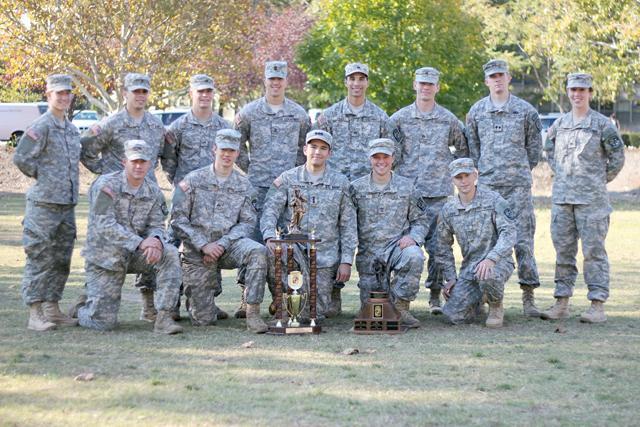Levi Ruff, a senior in international studies, was exempt from going to Army ROTC’s routine 5:30 a.m . physical training sessions last week. Ruff and a dozen of cadets were able to sleep in as part to celebrate their victory in the Fourth Brigade Ranger Challenge competition.
The Ranger Challenge team traveled to Fort Pickett, Virginia to compete against 40 schools on the east coast and for the first time in N.C . State history took first place. According to Ruff, the team deserved the week off considering the time and energy invested in the preparation of pulling off a win in the rigorous competition.
“We put in a lot of extra time training since school started,” Ruff, Ranger Challenge team leader, said. “We did additional PT. Early mornings became routine.”
Cadet Matt Oppenheim , a senior in business administration, led the team with Ruff in their fourth year competing in the event. According to Oppenheim , selection onto the team requires physical and mental strength.
“We first administered a PT test and then made our first round of cuts,” Oppenheim said. “This was a standard Army PT, which includes a two minute pushup test, two minutes of situps and a two mile run.”
This first test required cadets to undergo the exercises in their full combat uniforms rather than in athletic apparel.
“It makes it tough, but we wanted to simulate what things would be like in the competition,” Ruff said.
Leading up to the competition during the weekend of Oct. 21-23, the team of 13 trained in combat patrols, land navigation and night land navigation—critical parts of the competition.
The challenge consisted of eight events and aspiring Ranger teams were tested on terms of time. The team with the fastest accumulative time of all the events won first place. According to Cadet William Cauley , senior in history, this would not have been possible without the cohesiveness of the team.
“The army is based on the concept of the buddy,” Cauley said. “You look out for your buddy and he’ll look out for you. We duly followed that and employed it as soldiers on the field and it was the foundation of our success.”
According to Cauley , the team worked as a collaborative group with many people making contributions to the leadership.
“We succeeded with having everyone focused and committed to the task,” Cauley said. “It wasn’t like we work racing each other. We made sure we stuck together.”
Cadets were required to stick together during missions. According to Ruff, teams with cadets separated 50 meters apart faced penalties. All these penalties added up and teams with infractions suffered from additional time tacked to their overall time of completion.
According to Ruff, the N.C . State team was stronger than the sum of its parts.
“We didn’t even place first in physical fitness,” Ruff said. “I’m happy with our performance in that part of the competition, but it goes to show that missions aren ‘t completed by individuals.”
These physical fitness tests included a 400 meter [quarter mile] sprint, a 100 meter hurdle sprint, a high crawl test, a 50 meter casualty drag, a 100 meter ammunition shuttle sprint and a 100 meter sprint weaving in and out of cones.
Although not all the cadets have ambitions to go to Ranger school once commissioned as officers, the skills they acquired will help them as leaders and soldiers upon officially joining the Army.
“I feel I am a better equipped solider now,” Cauley said. “Overall, I am more physically fit. It indirectly makes everything, like leading and performing under pressure, easier.”
According to Cauley , fitness is one last thing to not have to worry about. At this point, Cauley and his fellow senior cadets are worrying about their assignments as commissioned officers, which they will find out about soon.








